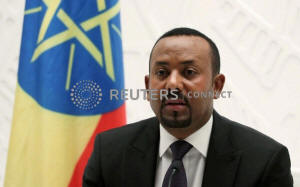Ethiopia's Abiy wins Nobel Peace Prize for ending Eritrea standoff
 Send a link to a friend
Send a link to a friend
 [October 11, 2019]
By Gwladys Fouche and Terje Solsvik [October 11, 2019]
By Gwladys Fouche and Terje Solsvik
OSLO (Reuters) - Ethiopian Prime Minister
Abiy Ahmed won the 2019 Nobel Peace Prize on Friday for his peacemaking
efforts which ended two decades of hostility with longtime enemy
Eritrea.
Though Africa's youngest leader still faces big challenges, he has in
under two years in power begun political and economic reforms that
promise a better life for many in impoverished Ethiopia and restored
ties with Eritrea that had been frozen since a 1998-2000 border war.
"We are proud as a nation," the prime minister's office said in a
statement, hailing a "collective win for all Ethiopians, and a call to
strengthen our resolve in making Ethiopia - the new horizon of hope - a
prosperous nation for all."
The Nobel Committee said Abiy had won the prestigious prize for "efforts
to achieve peace and international cooperation, and in particular for
his decisive initiative to resolve the border conflict with neighboring
Eritrea."
It said the prize was meant to recognize "all the stakeholders working
for peace and reconciliation in Ethiopia and in the East and Northeast
African regions."

News of the award trickled slowly down to the streets of the Ethiopian
capital, Addis Ababa. Bisrat Hadte, a 45-year-old businessman, said he
was glad but the government still had much to do to improve daily life
in the country of about 100 million.
"The prime minister also has to work on to improve the economy and drive
down the cost of living," he told Reuters.
The Nobel Committee's decision appeared designed to encourage the peace
process, echoing the 1994 peace prize shared by Israeli and Palestinian
leaders and the 1993 award for moves towards reconciliation in South
Africa, said Dan Smith, head of the Stockholm International Peace
Research Institute.
"It is a case of wanting a constructive intervention in the peace
process ... to give leverage and encouragement," he told Reuters.
"The challenge now is internal for Abiy Ahmed, with Ethiopia needing to
deal with the consequences of long-term violence, including three
million displaced people and the need for continuing the political
process."
Abiy had been bookmakers' second favorite to win, behind the teenage
Swedish climate change campaigner Greta Thunberg.
CHALLENGES AHEAD FOR ABIY
Abiy, now 43, took office in April 2018 after the resignation of
Hailemariam Desalegn following three years of street unrest.
[to top of second column]
|

Ethiopia's Prime Minister Abiy Ahmed speaks at a news
conference at his office in Addis Ababa, Ethiopia August 1,
2019. REUTERS/Tiksa Negeri

From partial liberalization of the state-controlled economy to
overhauling the security forces that had helped the ruling coalition
maintain a tight grip on power since 1991, the promises have raised
hopes in the country and abroad.
Abiy's landmark achievement to date is securing peace with
neighboring Eritrea.
What remains to be seen is whether Abiy - who joined the Ethiopian
army in his teens and rose through the ruling EPRDF coalition over
the past two decades - can reshape Ethiopia and open it up to the
world from within the current system.
He faces resistance to change from vested interests within his
coalition and the possibility that violence, including in June when
a rogue state militia leader killed the region's state president and
other top level officials, could escalate.
Abiy also faces high expectations from young Ethiopians who want
jobs, development, and opportunities.
"As an Ethiopian actually I am very happy that the prime minister
won the Nobel peace prize," said Desalegn Chane, president of the
new National Movement of Amhara (NAMA) party told Reuters by phone.
"However, we still have legitimate concerns and grievances that Abiy
needs to address. The political repression our people the Amhara
have been suffering from has continued under Abiy."
"Three of our party leaders are still in jail suspected of being the
plotters of the June coup attempt but still havenít been formally
charged," he said.
The Nobel Peace Prize will be presented in Oslo on Dec. 10, the
anniversary of the death of Swedish industrialist Alfred Nobel, who
founded the awards in his 1895 will.
(Reporting by Gwladys Fouche, Terje Solsvik, Victoria Klesty,
Nerijus Adomaitis and Lefteris Karagiannopoulos in Oslo, Giulia
Paravicini, Maggie Fick and Katharine Houreld in Nairobi, Editing by
Timothy Heritage)
[© 2019 Thomson Reuters. All rights
reserved.]
Copyright 2019 Reuters. All rights reserved. This material may not be published,
broadcast, rewritten or redistributed.
Thompson Reuters is solely responsible for this content.
 |